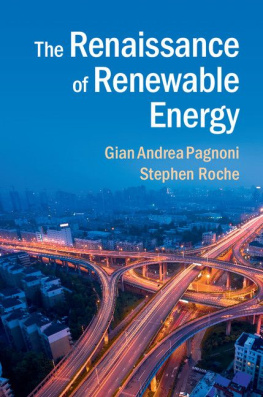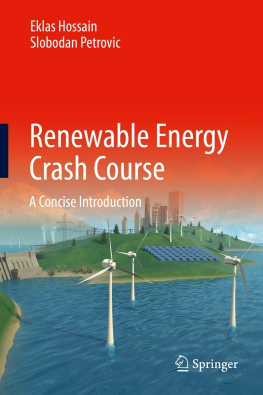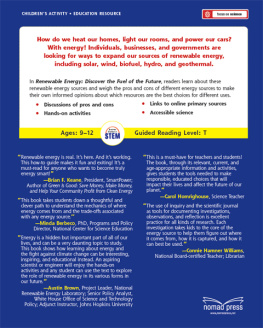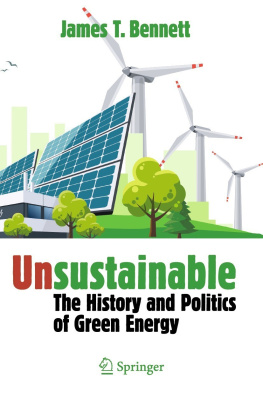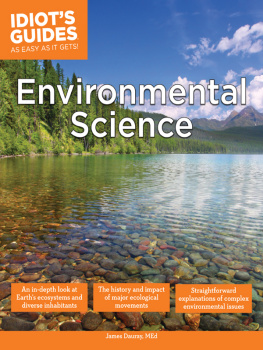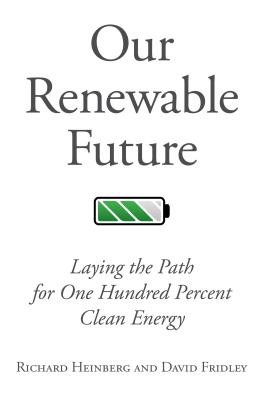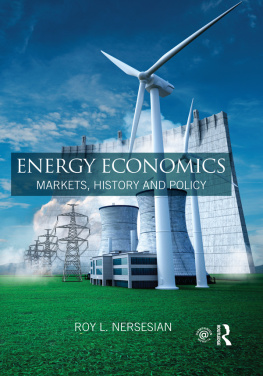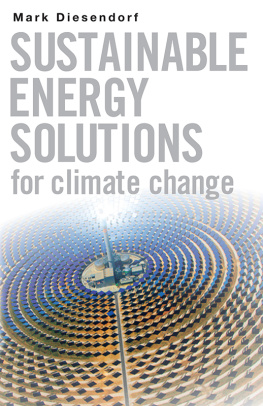The Renaissance of Renewable Energy
One of the most important issues facing humanity is the prospect of global climate change, brought about primarily by our dependence on fossil fuels. If we continue to use the present mix of fuels even as the worlds economy and population grow we will invite very serious consequences. Common sense dictates that we switch to more renewable and sustainable sources of energy.
This book provides detailed yet easily understandable information about sustainable energy alternatives in the context of growing public concern about climate change, the impending fuel crisis and environmental degradation. It describes the history of energy use and the factors that have led to the current interest in energy alternatives, and assesses the chances of renewable energy replacing fossil fuels.
The authors manage to make a highly complex and often intimidating subject not only accessible but also engaging and entertaining. This book unpacks but never simplifies the science of energy, leavening the more technical passages with anecdotes, metaphors, examples and imagery. By also dealing with the history, politics and economics of energy use, it offers both scientific and non-scientific readers a deeper understanding of one of the most important issues of our age.
GIAN ANDREA PAGNONI is a lecturer at the University of Ferrara. He has published eleven books on travel and science in his native Italy, as well as numerous scientific papers on environmental issues. His most recent book, Impianti a biomasse per la produzione di energia (Biomass plants for energy production), was published in 2011. In 2001, he co-founded the Istituto Delta di Ecologia Applicata Srl (the Delta Institute of Applied Ecology), an independent consultancy for environmental assessments and environmental project management. In recent years, he has focused mainly on the fields of renewable energy and environmental conservation.
STEPHEN ROCHE heads the publication department of the UNESCO Institute for Lifelong Learning in Hamburg, Germany, and edits a scholarly journal, the International Review of Education . From 2005 to 2012, he ran an agency, Network Translators, which translated or edited more than 100 books, reports and research papers on architecture, economics, education, environmental science, history and international development. From 2009 to 2012, he also worked at the University of Hamburg, developing and teaching courses in academic writing and English literature.
The Renaissance of Renewable Energy
Gian Andrea Pagnoni
and
Stephen Roche
32 Avenue of the Americas, New York, NY 10013-2473, USA
Cambridge University Press is part of the University of Cambridge.
It furthers the Universitys mission by disseminating knowledge in the pursuit of education, learning and research at the highest international levels of excellence.
www.cambridge.org
Information on this title: www.cambridge.org/9781107698369
Gian Andrea Pagnoni and Stephen Roche 2015
Cartoons provided courtesy of Roberto Malfatti (http://rmalfatti.blogspot.it)
This publication is in copyright. Subject to statutory exception and to the provisions of relevant collective licensing agreements, no reproduction of any part may take place without the written permission of Cambridge University Press.
First published 2015
Printed in the United States of America
A catalog record for this publication is available from the British Library.
Library of Congress Cataloging in Publication data
Pagnoni, Gian Andrea.
The renaissance of renewable energy / Gian Andrea Pagnoni, Stephen Roche.
pages cm
Includes bibliographical references and index.
ISBN 978-1-107-02560-8 (hardback) ISBN 978-1-107-69836-9 (paperback)
1. Renewable energy sources. 2. Energy consumption--Environmental aspects. I. Roche, Stephen. II. Title.
TJ808.P33 2014
333.794dc23 2014026000
ISBN 978-1-107-02560-8 Hardback
ISBN 978-1-107-69836-9 Paperback
Cambridge University Press has no responsibility for the persistence or accuracy of URLs for external or third-party Internet Web sites referred to in this publication and does not guarantee that any content on such Web sites is, or will remain, accurate or appropriate.
Everything in the universe may be described in terms of energy. Galaxies, stars, molecules, and atoms may be regarded as organizations of energy. Living organisms may be looked upon as engines which operate by means of energy derived directly or indirectly from the sun. The civilizations, or cultures of mankind, also, may be regarded as a form or organization of energy.
Leslie White, 1943
Contents
Preface
This book began with a skiing trip in the Alps in January 2010. Gian Andrea and I had known each other since 1990, when, as students, we shared an apartment in Ireland. Having lost touch for more than a decade, we had recently renewed the friendship. Conversations between old friends tend to cover a lot of ground very quickly. We filled each other in on relationships past and present, on travels and travails, past and current work, and where we thought we were heading. Id been working as a translator and editor for several years. Gian Andrea had set up an environmental consulting company with other scientists from the University of Ferrara and balanced this work with additional teaching and writing.
He had always been a practical man. In kitchen table conversations during our student days, he didnt shy away from controversial positions, exposing the contradictions within many closely held beliefs. He once declared, to the horror of several humanities students, that he felt no attachment to language, and that the disappearance of his native Italian would be of no consequence provided it were replaced by a more efficient substitute, such as, for example, English. I was bemused and a little shocked by his lack of sentimentality, but I appreciated his dedication to objectivity.
At the time of the skiing trip I was starting to tire of my ventriloquial craft, so when he suggested an alternative, I was curious. If youre tired of working on other peoples books, you should write your own. In fact, we could write one together. I had recently attended the UN Climate Change Conference in Copenhagen, so the point where my interests and his expertise most clearly intersected was obvious: sustainable energy.
The process began with a series of Skype conversations, leading to a proposal we jointly composed using Google Drive. As the project progressed, Skype and Google became indispensable tools, allowing for a kind of collaboration that would not have been possible without them. Though we were living about 1,000 kilometres apart, most evenings, for a couple of hours, we stepped into the same virtual room. Most of the sections began with a conversation, during which Gian Andrea introduced a particular idea or data, and I, by a kind of Socratic process, teased out what that meant in laymans terms. Once we felt we had arrived at an explanation that conveyed the essence without compromising the scientific fact, we composed the particular section. Eventually, we corrected these together and discussed figures, captions and changes. We probably wrote ten times the number of words currently in the book. The result is neither the work of a scientist simplifying things for the layman nor of the layman coming to grips with science; rather, it is a marriage of the two.

